Front Cover
Journal from 13 Nov. 1779 to 6. January 1780.
No 30.
[The preceding text was added in the handwriting of Charles Francis Adams]
P. B [Paper Book] No 30
[The preceding text was added in the handwriting of Charles Francis Adams]
Inside Front Cover
Page i
Page ii
Page 1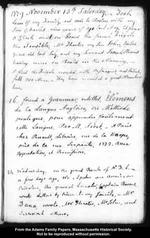
1779 NOVEMBER 13TH. SATURDAY.
Took Leave of my Family, and rode to Boston with my Son Charles, nine years of Age last May. At four O Clock went on board the french Frigate the Sensible, Mr. Thaxter, my Son John, twelve Years old last July, and my Servant Joseph Stevens having come on Board in the Morning. -- I find the Frigate crouded with Passengers, and Sailors, full 350 Men. They have recruited a great Number here.
16.
Found a Grammar, entitled, l mens de la Langue Angloise, ou M thode pratique, pour apprendre facilement cette Langue. Par M. Siret, A Paris, chez Ruault, Libraire, rue de la Harpe, pr s de la rue Serpente. 1773. Avec Approbation, et Permission.
24 WEDNESDAY.
On the grand Bank of N.F.L. [Newfoundland] A few days ago, We spoke an American Privateer, the General Lincoln; Captain Barnes. Wrote Letters by him to my family. Mr. Dana wrote. Mr. Thaxter, Mr. John, and several others.
Page 2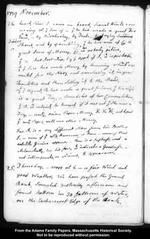
1779 November.
24.
Heard, since I came on board, several Hints concerning W. [Winslow Warren]; Son of [Gen. James Warren]. That he has made a great Fortune -- by Privateering, by Trade, by buying Soldiers Sailors Shares, and by gambling. That he has won of C. a great Sum of Money. C., whom nobody pities. That has lost Rep. by the Appointment of S., which is probable. That the Son has made Money, by knowing what was wanted for the Navy, and purchasing it, in great Quantities and then selling it, to the Board. That the Agent, B., has made a great fortune. That his Wife is a great Tory. Anecdotes of her Conversation. That B. would certainly be hanged, if it was not that she was a Tory. Nasty, Poison Paper Money, &c. &c. &c. Not to put that nasty Paper, with our other Money.
Jer. A. [Jeremiah Allen] is a very different Man from his Brother J. None of that Wit, Humour, or Fun -- none of that volatile Genius appears. There is a Softness, and a Melancholly, in his face, which indicates a Goodness. Not intemperate, or vicious, to Appearance.
25. THURSDAY.
Arose at 4. A fair Wind and good Weather. We have passed the Grand Bank, sounded Yesterday afternoon and found bottom in 30 fathom of Water, on the Eastermost Edge of the Bank.
Page 3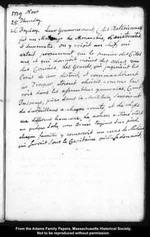
1779 Novr
25. Thursday.
26. FRYDAY.
Leur Gouvernement, (des Bataviennes) fut un Malange de Monarchie, d'aristocratie, et democratie. On y voioit un chef, qui n'etoit proprement, que le premier des Citoiens, et qui donnoit, moins des ordres, que des Conseils. Les Grands, qui jugeoient les Proc s de leur district, et commandoient les Troupes, etoient choisis, comme les rois dans les assemblees generales. Cent Personnes, prises dans la Multitude, servoient de Surveillans a chaque comte, et de chefs aux differens hameaux. La nation entiere toit en quelque Sorte, une Arm e toujours Sur pied. Chaque famille y composoit un corps de Milice qui servoit sous le Capitaine qu'elle se donnoit.
Page 4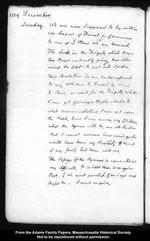
1779 DECEMBER.
[5.] SUNDAY.
We are now supposed to be within 100 Leagues of Ferrol or Corunna, to one of which Places We are bound. The Leak in the Frigate, which keeps two Pomps constantly going, has determined the Captn. to put into Spain.
This Resolution is an Embarrassment to me. Whether to travail by Land to Paris, or wait for the Frigate. Whether I can get Carriages, Horses, Mules &c. What Accommodations I can get upon the Road, how I can convey my Children, what the Expence will be, are all Questions that I cannot answer. How much greater would have been my Perplexity, If the rest of my family had been with me.
The Passage of the Pyrenees is represented as very difficult. It is said there is no regular Post. That we must purchase Carriages and Horses &c. I must enquire.
Page 5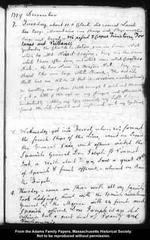
1779 DECEMBER
7. TUESDAY.
About 11. O Clock discovered Land two large Mountains, one sharp and steep, another large and broad. We passed 3 Capes Finisterre, Tortanes [Torina a] and Veillane [Villano].
Yesterday the Chevr. de la Molion gave me some Nuts which he call'd Noix d'Acajou. They are the same which I have often seen, and which were called Cooshoo Nuts. The true name is Acajou Nuts. They are shaped like our large white Beans. The outside Shell has an Oil in it that is corrosive, caustic, or burning. In handling one of these Shells enough to pick out the meat I got a little of this oyl on my fingers, and afterwards inadvertently rubbing my Eyes, especially my Left, I soon found the Lids swelled and inflamed up to my Eyebrow.
8 WEDNESDAY.
Got into Ferrol, where We found the french Ships of the Line, went on Board the General Sade, went ashore, visited the Spanish General Don Joseph St. Vincent, took a Walk about Town, saw a great No. of Spanish and french officers. Returned on Board the Frigate.
9. THURSDAY.
Came on Shore with all my family. Took Lodgings. Dined with the Spanish Lieutenant General of the Marine with 24 french and Spanish officers. Don Joseph is an old Officer, but [has] a great deal of Vivacity and Bonhommie.
Page 6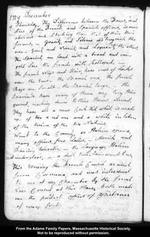
1779 December
9. THURSDAY.
The Difference between the Faces and Airs of the French and Spanish Officers, is more obvious and striking than that of their Uniforms. Gravity and Silence distinguish the one, Gaiety and Vivacity and Loquacity the others. The Spanish are laced with a broad and even gold Lace, the french with scalloped. The french Wigs and Hair have rows of Locks over the Ears, the Spanish one. The french Bags are small, the Spanish large. The Spaniards have many of them very long Hair queued, reaching down to their Hams almost. They have all a new Cock Aid, which is made up of two a red one and a white in token of the Union of the two Nations.
Went to the Comedy, or Italien opera. Many Officers, few Ladies. Musick and Dancing tolerable. The Language, Italien, not understood. A dull Entertainment to me.
This Evening the French Consul arrived from Corunna, and was introduced to me at my Chamber by the french Vice Consul at this Place. Both made me the politest Offers of Assistance of every Sort.
Page 7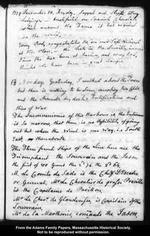
1779 DECEMBER 10. FRYDAY.
Supped and slept at my Lodgings. Breakfasted on Spanish Chocolate which answers the Fame it has acquired in the World.
Every Body congratulates Us, on our Safe Arrival at this Place. The Leak in the Sensible, increases since she has been at Anchor, and every Body thinks We have been in great danger.
13 MONDAY.
Yesterday, I walked about the Town but there is nothing to be seen, excepting two Churches and the Arsenals, dry docks, Fortifications and Ships of War.
The Inconvenience of this Harbour is, the Entrance is so narrow, that there is no Possibility of going out but when the Wind is one Way, i.e. South East, or thereabouts.
The Three french Ships of the Line here are the Triomphant, the Souverain and the Jason, the first of 80 Guns, the 2d. 74, the 3d. 64.
M. Le Comte de Sade is the Chef D'Escadre or General. Mr. Le Chevalier de Grasse Preville is the Capitaine de Pavillon.
Mr. Le Chevr. de Glandevesse is Capitain of the Souverain.
Mr. de la Marthonie commands the Jason.
Page 8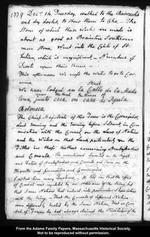
1779 DECR. 14. TUESDAY.
Walked to the Barracks and dry docks, to shew them to Cha [Charles]. The Stone of which these Works are made is about as good as Braintree Southcommon Stone. Went into the Church of St. Julien, which is magnificent -- Numbers of Devots upon their Knees.
This afternoon We cross the Water to go to Corunna.
We have lodged en la Calle Street de la Madalena, junto near coca, the Head en casa the House de of Pepala Botoneca.
The Chief Magistrate of this Town is the Corregidor. Last Evening and the Evening before I spent, in Conversation with the Consul, on the Law of Nations and the Writers on that Law, particularly on the Titles in those Authors concerning Ambassadors and Consuls. He mentioned several on the Rights and Duties of Ambassadors and Consuls, and some on the Etiquette and formalities and Ceremonies.
I asked him many Questions. He told me that the Office of Consul was regulated by an Ordinance of the King, but that some Nations had entered into particular Stipulations with the King. That the Consuls of different Nations were differently treated by the same Nation. That as Consul of France he had always claimed the
Priviledges of the
Page 9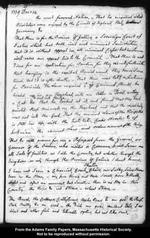
1779 Decr 14.
the most
favoured Nation. That he enquired what
Priviledges were enjoyed by the Consuls of England, Italy,
Holland Germany &c.
That there is for the Province of Gallice, a Sovereign Court of Justice which has both civil and criminal Jurisdiction. That it is without Appeal in all criminal Cases: but in some civil cases an appeal lies to the Council. That there is not Time for an Application for Pardon for they execute forthwith. That hanging is the capital Punishment. They burn, some times, but it is after death. That there was lately a sentence for Parricide. The Law required that the Criminal should be headed up in an Hogshead, with an Adder, a Toad, a Dog, a Cat, &c. and cast into the Sea. That he looked at it, and found that they had printed those Animals on the Hogshead, and that the dead body was put into the Cask. That the ancient Laws of the Visigoths is still in Use, with the Institutes, Codes, Novelles &c. of Justinian the current law and ordonnances of the King.
That he will procure for me a Passeport from the General, or Governor of the Province, who resides [at] Corunna, which will secure me all Sorts of facilities as I ride the Country, but whether through the Kingdom or only through the Province of Galicia I dont know.
I have not seen a Charriot, Coach, Phaeton, Chaise, nor Sulky, since I have been in the Place. Very few Horses, and those small, poor and shabby. Mules and Asses are numerous, but small. There is no Hay in this Country. The Horses &c. eat Straw -- Wheat Straw.
The Bread, the Cabbages, Colliflowers, Apples, Pears &c. are good. The Beef, Pork, Poultry &c. are good. The Fish are good, excellent Eels, Sardines and other fish and tolerable Oysters, but not like ours.
Page 10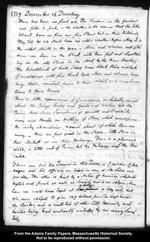
1779 December 14. Tuesday.
There has been no frost yet. The Verdure in the Gardens and fields is fresh. The Weather is so warm that the Inhabitants have no fires, nor fire Places but in their Kitchens. They tell us We shall have no colder Weather before May, which is the coldest Month in the Year. Men and Women and Children are seen in the Streets, with bare feet and Legs standing on the cold Stones in the Mud, by the Hour together. The Inhabitants of both Sexes, have black Hair, and dark Complexions with fine black Eyes. Men and Women have long Hair ramilied down to their Waists and even some times to their Knees.
There is little Appearance of Commerce or Industry except about the Kings Docks and Yards and Works. Yet the Town has some Symptoms of growth and Prosperity. Many new Houses are building of Stone, which comes from the rocky Mountains round about of which there are many. There are few goods in the Shops. Little show in their Markett or on their Exchange. There is a pleasant Walk, a little out of Town between the Exchange and the Barracks.
There are but two Taverns in this Town. Captain Chavagne and his Officers are lodged in one, at Six Livres each per day. The other is kept by a Native of America who speaks English and french as well as Spanish and is an obliging Man. Here We could have loged at Six Livres a dollar a day each, but We were obliged to give 129 dollars for six days besides the Barber, and a multitude of other little Expences, and besides being kept constantly unhappy by an uneasy Land lady.
Page 11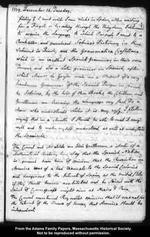
1779. December 14. Tuesday.
Finding that I must reside some Weeks in Spain, either waiting for a Frigate or travelling through the Kingdom, I determined to acquire the Language, to which Purpose, I went to a Bookseller and purchased Sobrino's Dictionary in three Volumes in Quarto, and the Grammatica Castellana which is an excellent Spanish Grammar, in their own Tongue, and also a Latin grammar in Spanish, after which Monsr. de Grasse made me a Present of a very handsome Grammar of the Spanish Tongue in french by Sobrino. By the help of these Books, the Children and Gentlemen are learning the Language very fast. To a Man who understands Latin it is very easy. I flatter myself that in a Month I should be able to read it very well and to make myself understood as well as understand the Spaniards.
The Consul and Mr. Linde an Irish Gentleman a Master of a Mathematical Academy here, say that the Spanish Nation in general have been of Opinion that the Revolution in America was of a bad Example to the Spanish Colonies and dangerous to the Interests of Spain, as the United States if they should become ambitious and be seised with the Spirit of Conquest might aim at Mexico and Peru.
The Consul mentioned Reynalles Opinion that it was not for the Interest of the Powers of Europe, that America should be independant.
Page 12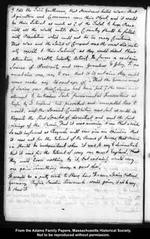
I told the Irish Gentleman, that Americans hated War: that Agriculture and Commerce were their Objects, and it would be their Interest as much as that of the Dutch to keep Peace with all the World, untill their Country should be filled with Population which could not be in many Centuries. That War and the Spirit of Conquest was the most diametrically opposite to their Interests, as they would divert their Attention, Wealth, Industry, Activity &c. from a certain Source of Prosperity, and even Grandeur and Glory, to an uncertain one, nay to one that it is certain they could never make any Advantage of. That the Government of Spain over their Colonies had been such that she never could attempt to introduce such fundamental Innovations as those by which England had provoked and compelled hers to revolt, and the Spanish Constitution was such as could extinguish the first Sparks of discontent, and quel the first risings of the People. That it was amazing to me that a Writer so well informed as Reynale could ever give an Opinion that it was not for the Interest of the Powers of Europe, that America should be independant, when it was so easy to demonstrate that it was for the Interest of every one, except England. That they could loose nothing by it, but certainly would every one gain Something, many a great deal.
It would be a pretty Work to shew, how France, Spain, Holland, Germany, Russia, Sweeden, Denmark would gain. It would be easy to shew it.
Page 13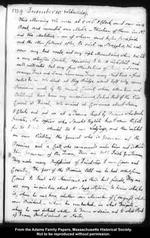
1779 DECEMBER 15. WEDNESDAY.
This Morning We arose at 5 or 6 O Clock, went over in a Boat, and mounted our Mules. Thirteen of them in Number and two Mulateers -- one of whom went before for a Guide and the other followed after, to pick up Stragglers. We rode over very bad roads, and very high Mountains, where We had a very extensive Country, appearing to be a rich Soil and well cultivated but very few Plantations of Trees. Some orange Trees and some Lemmon Trees, many Nut trees, a few Oaks &c. We dined at Hog Bridge, about half Way, upon Provision made by the french Consul, whose Attention and Politeness has been very conspicuous, so has that of the Vice Consul at Ferrol. We arrived at Corunna about seven O Clock and put up at a Tavern kept by Persons who speak french. An Officer who speaks English kept open the Gate for Us to enter, attended Us to our Lodgings, and then insisted on our Visiting the General who is Governor of the Province and a Coll., who commands under him and is Military Governor of the Town. These are both Irish Gentlemen. They made many Professions of Friendship to our Cause and Country. The Governor of the Province, told me he had orders from Court to treat all Americans as their best friends. They are all very inquisitive about Mr. Jays Mission, to know who he is, where he was born, whether ever Member of Congress, whether ever President. When he embarked, in what Frigate, where he was destined, whether to France or Spain, and to what Port of France, Brest, L'orient or Nantes.
Page 14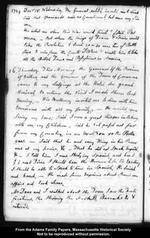
1779 Decr 15. Wednesday.
The General politely invited me to dine. Said that Spaniards made no Compliments, but were very sincere.
He asked me when this War would finish? I said Pas encore -- But when the Kings of France and Spain would take the Resolution to send 20 or 30 more line of Battle Ships to reinforce the Comte d'Estain and enable him to take all the British Forces and Possessions in America.
16. THURSDAY.
This Morning the Governor of the Province of Gallice, and the Governor of the Town of Corunna came to my Lodgings at the Hotel du grand Amiral, to return the Visit I made them last Evening. His Excellency invited me to dine with him tomorrow with all my family. He insisted upon seeing my Sons. Said I run a great Risque in taking with me, my Children. Said he had passed not far from my Country, in an Expedition vs. the Portugees. Said that he and every Thing in his Power was at my Service, &c. That he did not speak English, &c.I told him I was studying Spanish, and hoped that the next Time I should have the Honour to see his Excellency I should be able to speak to him in Spanish. He smiled and bowed. He made some Enquiries about American Affairs and took Leave.
Mr. Dana and I walked about the Town, saw the Fortifications, the Shipping, the Markett, Barracks &c. and returned.
Page 15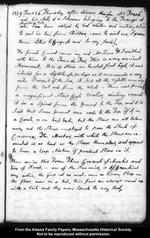
1779 Decr 16. Thursday.
After dinner
[illegible] Mr. Trash and his Mate, of a Schooner belonging to the Traceys of
Newbury Port, who have been obliged by bad Weather and contrary Winds to put in here from Bilboa, came to visit me. I gave them Letters to Congress and to my family
[John to Abigail, 16 December 1779]
.
The french Consul came in, and Mr. Dana and I walked with him to the Tour de Fer. This is a very ancient Monument. It is of Stone an hundred foot high. It was intended for a Lighthouse, perhaps as it commands a very wide Prospect of the Sea. It sees all the Vessells coming from the East and from the West. There was formerly a magnificent Stair Case Escalier, winding round it in a Spiral from the Ground to the Top, and it is said that some General once rode to the Top of it, in a Coach, or on horse back. But the Stairs are all taken away and the Stones employed to pave the Streets of Corunna. The Mortar, with which the Stones are cemented is as hard as the Stones themselves, and appears to have a large Mixture of powdered Stone in it.
There are in this Town Three Convents of Monks and two of Nuns. One of the Nunneries, is of Capuchins, very austere. The Girls eat no meat, wear no linnen, sleep on the floor never on a bed, their faces are always covered up with a Veil and they never speak to any Body.
Page 16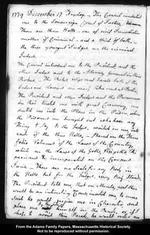
1779 DECEMBER 17. FRYDAY.
The Consul conducted me to the Souvereign Court of Justice. We were There are three Halls -- one of civil jurisdiction, another of Criminal, and a third of both. The three youngest judges are the criminal judges.
The Consul introduced me to the President, and the other judges and to the Attorney General in their Robes. The Robes, Wigs and bands both of the judges and Lawyers are nearly like ours at Boston. The President and other judges and the Procureur du Roi treated me with great Ceremony, conducted me into the Place in the Prison, where the Prisoners are brought out who have any Thing to say to the judges. Waited on me, into each of the three Halls. Shewed me the Three folio Volumes of the Laws of the Country, which are the Laws of the Goths, Visigoths, Ripuarians &c., incorporated on the Corpus Juris. There are no Seats for any Body in the Halls but for the judges. Every Body stands. The President told me, that on Monday next there would be an interesting Cause, invited me to come, said he would receive me in Character, and place me
next by the side of himself on the Bench. Or if I chose to avoid this Parade, he would order an
Page 17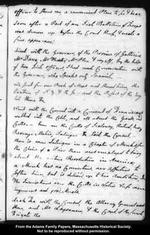
Officer to
shew me, a convenient Place to see and hear.
Soon after a Part of an Irish Battalion of Troops was drawn up before the Court House, and made a fine Appearance.
Dined with the Governor, of the Province of Gallicia. Mr. Dana, Mr. Thaxter, Mr. Allen and myself. By the help of two Irish Officers, I had much Conversation with the Governor, who speaks only Spanish.
We sent for our Book of Maps and shewed him, the Position of N.Y. and R. Is., and the Possessions of the English there &c.
Went with the Consul into a Convent of Franciscans. Walked into the Church, and all about the Yards, and Cells. Here are the Cells of Jealousy, Hatred, Envy, Revenge, Malice, Intrigue &c. said the Consul. There is more Intrigue in a Chapter of Monks for the Choice of a Prior than was employed to bring about the entire Revolution in America. A Monk has no Connections, nor Affections to soften him, but is delivered up to his Ambition, &c. The Inscriptions over the Cells in Latin Verse
[Diary 30, 17 December 1779]
were ingenious and good Morals.
Drank Tea with the Consul. The Attorney General was there, and Mr. Logoanere, and the Captain of the french Frigate the [Belle Poule.]
Page 18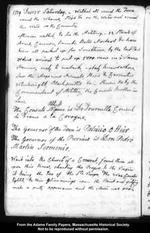
1779 DECR. 18 SATURDAY.
Walked all round the Town, round the Wharves, Slips &c. on the Water and round the Walls vs. the Country.
Afternoon walked, to see the Artillery. 12 Stands of Arms, Cannon, Bombs, Balls, Mortars &c. have been all packed up for Sometime. By the last Post Orders arrived to put up 5000 more in the same Manner, ready to embark, nobody knows where. Saw the Magazines, Arsenals, Shops &c., Carpenters, Wheelwrights, Blacksmiths &c. -- shewn Us by the Commandant of Artillery, the Consuls Brother in Law.
The Consuls Name Address is De Tournelle Consul de France a la Corogne.
The Governor of the Town is Patricio O Heir.
The Governor of the Province is Don Pedro Martin Sermenio.
Went into the Church of a Convent, found them all upon their Knees, chanting the Prayers to the Virgin, it being the Eve of the Ste. Vierge. The Wax Candles lighted, by their Glimmerings upon the Paint and Gilding made a pretty Appearance and the Music was good.
Page 19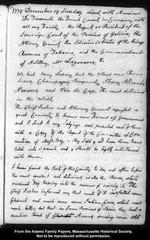
1779 DECEMBER 19. SUNDAY.
Dined, with Monsieur De Tournelle the French Consul, in Company, with all my Family, the Regent, or President of the Sovereign Court of the Province of Galicia, the Attorney General, the Administrator of the Kings Revenue of Tobacco, and the Commandant of Artillery, Mr. Lagonaore, &c.
We had every Luxury, but the Wines were Bourdeaux, Champagne, Burgundy, Sherry, Alicante, Navarre, and Vin de Cap. The most delicious in the World.
The Chief Justice and Attorney General expressed a great Curiosity, to know our Forms of Government, and I sent to my Lodgings and presented each of them with a Copy of the Report of the Committee of Convention of Mass. Bay. They said they would have them translated into Spanish, and they should be highly entertained with them.
I have found the Pork of this Country,
to day and often before, the most excellent and delicious, as also the Bacon, which occasioned My
Enquiry into the manner of raising it. The Chief justice informed me, that much of it was fatted upon
Chesnuts and much more upon Indian Corn, which was much better, but that in some Provinces of Spain they had a peculiar Kind of
Chesnut Acorns, growing upon old
Page 20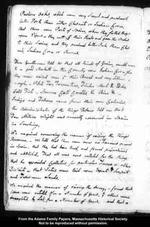
Pasture Oaks, which were very sweet and produced better Pork than either
Chesnuts or Indian Corn. That there were Parts of Spain, where they fatted Hogs upon Vipers -- they
cutt off their Heads and gave the Bodies to their Swine, and they produced better Pork than
Chesnuts, Indian Corn or Acorns.
These Gentlemen told Us that all Kinds of Grain, would come to a good Markett in this Country even Indian Corn for they never raised more than their Bread and very seldom enough. Pitch, Tar, Turpentine, Timber, Masts &c. would do. Salt Fish, Sperma Coeti Candles, &c. Rice &c. Indigo and Tobacco came from their own Colonies. The Administrator of the Kings Tobacco told me that Ten Million Weight was annually consumed in Spain in Smoking.
We enquired concerning the manner of raising the Kings Revenue. We [were] told that there were now no Farmers General in Spain. That they had been tried, and found prejudicial and abolished. That all was now collected for the King. That he appointed Collectors, for particular Towns or other Districts. That Duties were laid upon Exports and Imports and Taxes upon Lands.
We enquired the manner of raising the Army. Found that some were enlisted for a Number of Years. That others were
draughted by Lot, for a Number of Years. And that a
Page 21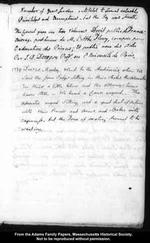
Number of Years service
entituled to several valuable
Priviledges and Exemptions -- but the Pay was small.
The Consul gave me two Volumes, Droit public de France: Ouvrage posthume de M. l'Abb Fleury, compose pour l'education des Princes; Et publi avec des Notes Par J. B. Daragon Prof. en l'Universit de Paris.
1779 DECR. 20. MONDAY.
Went to the Audiencia, where We saw the four judges setting in their Robes, the Advocates in theirs a little below and the Attorneys lower down still. We heard a Cause argued. The Advocates argued sitting, used a great deal of Action with their Hands and Arms, and spoke with Eagerness. But the Tone of oratory seemed to be wanting.
Page 22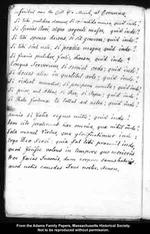
Inscribed over the Cell of a Monk, at Corunna.
Si tibi pulchra domus, si splendida mensa, quid inde?
Si Species Auri, atque Argenti massa, quid inde?
Si tibi sponsa decens, si sit generosa; quid inde?
Si tibi sint nati; si praedia magna, quid inde?
Si fueris pulcher, fortis, divesve, quid inde?
longus Servorum, si serviat Ordo; quid inde?
Si doceas alios in qualibet Arte; quid inde?
Si rideat mundus; si prospera cuncta; quid inde?
Si prior, aut Abbas, si Rex, si Papa; quid inde?
Si Rota fortunae to tollat ad astra; quid inde?
Annis si faelix regnes mille; quid inde?
tam cito praetereunt haec omnia, quae nihil inde?
Sola manet Virtus, qua glorificabimur inde:
Ergo Deo servi; quia sat tibi provenit inde,
quod fecisse volens in tempore quo morieris
Hoc facias juvenis, dum corpore sanus haberis.
quod nobis concedas Deus noster. Amen.
Page 23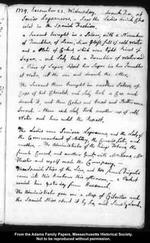
1779. DECEMBER 22. WEDNESDAY.
Drank Tea, at Senior Lagoaneres. Saw the Ladies drink Chocolat in the Spanish Fashion.
A Servant brought in a Salver, with a Number of Tumblers, of clean, clear Glass, full of cold Water, and a Plate of Cakes, which were light Pieces of Sugar. Each Lady took a Tumbler of Water and a Piece of Sugar, dipped her Sugar in her Tumbler of Water, eat the one and drank the other. The Servant then brought in another Salver, of Cups of hot Chocolat. Each Lady took a Cup and drank it, and then Cakes and bread and Butter were served. Then each Lady took another cup of cold Water and here ended the Repast.
The Ladies were Seniora Lagoanere, and the Lady of the Commandant of Artillery, the Consuls sister, and another. The Administrator of the Kings Tobacco, the french Consul, and another Gentleman, with Mr. Dana, Mr. Thaxter and myself made the Company.
Three Spanish Ships of the Line, and two french Frigates came into this Harbour this afternoon. A Packet arrived here Yesterday from Havannah.
The Administrator gave me a Map of Gibraltar and the Spanish Ships about it by Sea, and Lines by Land.
Page 24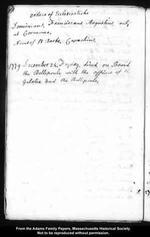
Orders of Ecclesiasticks
Dominicans, Franciscans, Augustins, only at Corrunna.
Nuns of St. Barbe. Capuchins,
1779 DECEMBER 24. FRYDAY.
Dined on Board the Bellepoule, with the Officers of the Galatea and the Bellepoule.
Page 25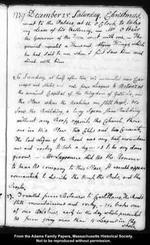
1779 DECEMBER 25. SATURDAY. CHRISTMAS.
Went to the Palace, at 11. O Clock, to take my Leave of his Excellency. Mr. O Heir the Governor of the Town went with me. The general repeated a Thousand obliging Things, which he had said to me, when I first saw him and dined with him.
26. SUNDAY.
At half after two, We mounted our Carriages and Mules, and rode four Leagues to Betanzos, the ancient Capital of the Kingdom of Gallicia, and the Place where the Archives are still kept. We saw the Building, a long Square stone Building without any Roof, opposite the Church. There are in this Place two Churches and two Convents. The last League of the Road was very bad, mountainous and rocky to such a degree as to be very dangerous. Mr. Lagoanere did Us the Honour to bear Us company to this Place. It would appear romantick to describe the House, the Beds, and the People.
27.
Travelled from Betanzos to Castillano. The Roads still mountainous and rocky. We broke one of our Axletrees, early in the day, which prevented Us from going more than 4 Leagues in the whole.
Page 26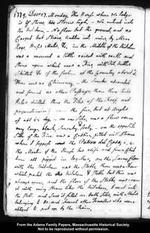
1779. Decr 27. Monday.
The House where We lodge is of Stone, two Stories high. We entered into the Kitchen. No floor but the ground, and no Carpet but Straw, trodden into mire, by Men, Hogs, Horses, Mules, &c. In the Middle of the Kitchen was a mound a little raised with earth and Stone upon which was a Fire, with Pots, Kettles, Skillets &c. of the fashion of the Country about it. There was no Chimney. The Smoke ascended and found no other Passage, than thro two Holes drilled thro the Tiles of the Roof, not perpendicularly over the fire, but at Angles of about 45 deg. -- On one Side, was a flew oven, very large, black, smoaky, and sooty. On the opposite Side of the Fire was a Cabbin, filled with Straw, where I suppose the Patron del Casa, i.e, the Master of the House, his Wife and four Children all pigged in together. On the same floor with the Kitchen was the Stable. There was a Door which parted the Kitchen and Stable but this was always open, and the floor of the Stable, was covered with miry Straw like the Kitchen. I went into the Stable and saw it filled on both Sides, with Mules belonging to Us and several other Travellers who were obliged to put up, by the Rain.
Page 27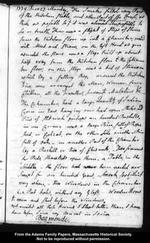
1779 Decr 27. Monday.
The Smoke filled every Part of the Kitchen, Stable, and other [Parts] of the House, as thick as possible so that it was almost impossible very difficult to see or breath. There was a flight of Steps of Stone from the Kitchen floor up into a Chamber, covered with Mud and straw. On the left Hand as you ascended the stairs was a stage built up about half Way from the Kitchen floor to the Chamber floor. On this stage was a bed of straw on which lay a fatting Hog. Around the Kitchen Fire, were arranged the Man, Woman, four Children, all the Travellers, Servants, Mulatiers &c. The Chamber had a large Quantity of Indian Corn in Ears, hanging over head upon Sticks and Pieces of slit Work, perhaps an hundred Bushells. In one Corner was a large Bin, full of Rape seed, or Colzal, on the other Side another Bin full of Oats. In another Part of the Chamber lay a Bushell or two of Chesnutts. Two frames for Beds, straw Beds upon them. A Table, in the Middle. The floor had never been washed nor swept for an hundred Years -- Smoak, soot, Dirt, every where. Two Windows in the Chamber, i.e. Port holes, without any Glass. Wooden Doors to open and shut before the Windows.
Yet amidst all these Horrors, I slept better than I have done before, since my Arrival in Spain.
Baa monde.
Page 28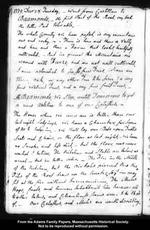
1779. DECR. 28. TUESDAY.
Went from Castillan to Baamonde. The first Part of the Road, very bad, the latter Part tolerable.
The whole Country We have passed, is very mountainous and rocky. There is here and there a Vally, and here and there a Farm that looks beautifully cultivated. But in general the Mountains are covered with Furze, and are not well cultivated. I am astonished to see so few Trees. Scarce an Elm, Oak, or any other Tree to be seen. A very few Walnut Trees, and a very few fruit Trees.
At Baamonde, We stop untill Tomorrow to get a new Axletree to one of our Calashes.
The House where We now are is better, than our last nights Lodgings. We have a Chamber, for seven of Us to lodge in. We shall lay our Beds upon Tables, Seats and Chairs, or the floor as last night. We have no Smoke and less dirt, but the floor was never washed I believe. The Kitchen and Stable are below as usual, but in better order. The Fire in the Middle of the Kitchen, but the Air holes pierced thro the Tiles of the Roof draw up the smoke, so that one may set at the fire without Inconvenience. The Mules, Hogs, fowls, and human Inhabitants live however all together below, and Cleanliness seems never to be tho't of. Our Calashes and Mules are worth describing.
Page 29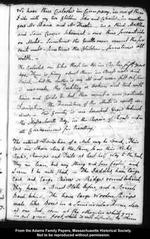
We have three Calashes in Company. In one of them I ride with my two Children John and Charles. In another goes Mr. Dana and Mr. Thaxter. In a third Mr. Allen and Sam. Cooper Johonnot. Our three servants ride on Mules. Sometimes the Gentlemen mount the servants mules -- sometimes the Children -- sometimes all walk.
The Calashes are like those in Use in Boston fifty Years ago. There is finery about them in Brass nails and Paint, but the Leather is very old and never felt Oil, since it was made. The Tackling is broken and tied with twine and Cords &c. but these merit a more particular Description. The Furniture of the Mules is equally curious. This Country is an hundred Years behind the Massachusetts Bay, in the Repair of Roads and in all Conveniences for travelling.
The natural Description of a Mule may be spared. Their Ears are shorn close to the skin, so are their Necks, Backs, Rumps and Tails at least half Way to the End. They are lean, but very strong and sure footed, and seem to be well shod. The Saddles have large Ears, and large Rims or Ridges round behind. They have a Breast Plate before, and a Breech Band behind. They have large Wooden
Stirrips made like Boxes in a semicircular Form, close at one End, open at the other, in which you insert your foot, which is well defended by them
Page 30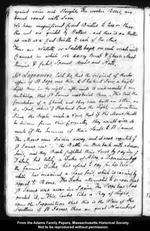
against rain and Sloughs. The wooden Boxes are bound round with Iron.
We have magnificent Curb Bridles to two or three. The rest are guided by Halters. And there is an Halter as well as a Curb Bridle to each of the others.
There are Walletts, or Saddle bags, on each made with Canvas, in which We carry Bread and Cheese, Meat, Knives and forks, Spoons, Apples and Nutts.
Mr. Lagoanere told Us, that the Original of the affair of St. Iago, was this. A Shepherd saw a bright Light there in the night. Afterwards it was revealed to an Archbishop, that St. James was buried there. This laid the foundation of a Church, and they have built an Altar, on the Spot, where the Shepherd saw the Light. Some time since, the People made a Vow, that if the Moors should be driven from this Country they would give so much of the Income of their Lands to St. James. The Moors were driven away, and it was reported that St. James was in the Battle on Horse back with a drawn Sword, and the People fulfilled their Vows by Paying the Tribute, but lately a Duke of Alva, a Descendant of the famous Duke, has refused to pay for his Estate, which has occasioned a Law suit, which is carried by Appeal to Rome. The Duke attempted to prove that St. James was never in Spain. The Pope has suspended it. This looks like a Ray of Light. Upon the Supposition that this is the Place of the Sepulture of St. James, there are great Numbers
Page 31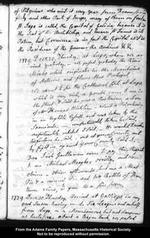
of Pilgrims who visit it every Year from France, Spain, Italy and other Parts of Europe, many of them on foot. St. Iago is called the Capitol of Galicia, because it is the Seat of the Archbishop, and because St. James is its Patron, but Corunna is in fact the Capital as it is the Residence of the Governor, the Audience &c. &c.
1779. DECR. 30. THURSDAY.
At Lugo, where We arrived Yesterday. We passed Yesterday the River Minho which originates in the Mountains of Asturies, and flows thro Portugal. We went to see the Cathedral Church at Lugo, which is very rich. A Youth came to me in the street and said he was a Bostonian, a Son of Mr. Thomas Hickling. Went a Privateering in an English Vessell and was taken by the Spaniards. -- Unfortunately taken he said. -- Unfortunately inlisted I said. -- He wanted to make his fortune he said. -- Out of your Country, and by fighting against your Country said I.
Two Irish Gentlemen came to pay their Respects to me, Michael Meagher Oreilly and Lewis Obrien. Obrien afterwards sent me a Meat Pie and a minced Pie and two Bottles of Frontenac Wine, which gave Us a fine Supper.
1779. Decr. 30. Thursday.
Arrived at Galliego, in very good Season having made Six Leagues and an half from Lugo . . . Mountainous, but not dangerous as heretofore. About a league back, We passed
Page 32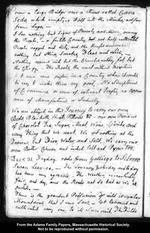
over a large Bridge over a River called Cara Sedo, which
emptyes itself into the Minho, not far from Lugo.
I see nothing but Signs of Poverty and Misery, among the People. A fertile Country, not half cultivated, People ragged and dirty, and the Houses universally nothing but Mire, Smoke, Fleas and Lice. Nothing appears rich but the Churches, nobody fat, but the Clergy. The Roads, the worst without Exception that ever were passed, in a Country where it would be easy to make them very good. No Simptoms of Commerce, or even of internal Trafic, no Appearance of Manufactures or Industry.
We are obliged, in this journey to carry our own Beds, Blanketts, Sheets, Pillows &c., our own Provisions of Chocolat, Tea, Sugar, Meat, Wine, Spirits, and every Thing that We want. We get nothing at the Taverns, but Fire, Water, and Salt. We carry our own Butter, Cheese, and indeed Salt and Pepper too.
DECR. 31 FRYDAY.
Rode from Galliego to Sebrero, Seven Leagues. The Journey Yesterday and to day has been very agreable. The Weather, remarkably fair, and dry, and the Roads not so bad as We expected.
There is the grandest Profusion of wild irregular Mountains, that I ever saw. Yet
laboured and cultivated every one, to its Summit. The Fields
Page 33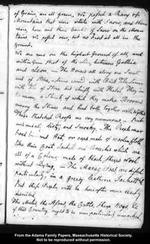
of Grain, are all green. We passed a Rang of Mountains that were white with Snow, and there were here and there banks of Snow on the Mountains We passed over, but no Frost at all in the Ground.
We are now on the highest Ground of all, and within Gun shot of the Line, between Gallice and Leon. The Houses all along are small and of Stone. Some covered with Brick Tile, some with Tile of Stone, but chiefly with Thatch. They interweave a Shrub, of which they make Brooms, among the Straw and bind both together with Wythes. These thatched Roofs are very numerous -- But universally dirty, and smoaky. The People wear broad brimmed Hats, or caps made of woolen Cloth like their Coats, Jackets and Breeches which are all of a Colour, made of black sheeps Wool without Dying. The Maragatoes are dressed particularly, in a greasy leathern jackett &c. But these People will be hereafter more exactly described.
The Mules, the Asses, the Cattle, Sheep, Hogs, &c. of this Country, ought to be more particularly remarked.
Page 34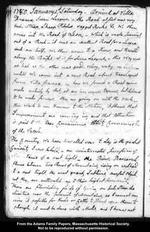
1780 JANUARY 1ST. SATURDAY.
Arrived at Villa Franca, Seven Leagues. The Road at first was very bad. Steep, sharp Pitches, ragged Rocks, &c. We then came into the Road of Leon, which is made seemingly out of a Rock. It was an excellent Road for a League and an half. We then came to a River, and travelled along the Banks of it for some Leagues. This Way was as bad as the other was good. Miry, rocky, up and down untill We came into a new Road, about two Leagues from Villa franca. Here We found a Road again made entirely by Art, at an immense Expence, but it seems to be made forever. They are going on with the Work. This Work is an Honour to the Nation. It shews that Improvements are coming in, and that Attention is paid to the Ease, Convenience, Utility, Commerce &c. of the People.
The Country We have travelled over
to day is the greatest Curiosity I ever beheld -- an uninterrupted succession of Mountains of a vast
hight. The River Barcarcel flows between two Rows of Mountains, rising on each hand to a vast
hight. The most grand, sublime, awful Objects, yet they are cultivated up to their highest summits. There are flourishing fields of Grain, on such steep declivities, near the Summits of Mountains, as I cannot conceive it possible for Horses or Cattle to stand upon them to plough. It must be done with Mules, and I know not
Page 35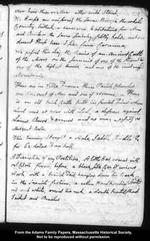
even how these or Men either could stand.
The Houses are uniformly the same through the whole Country hitherto -- common habitations for Men and Beasts -- the same smoaky, filthy holes. Not one decent House have I seen from Corunna.
We passed this Day, the Ruins of an Ancient Castle of the Moors, on the Summit of one of the steepest and one of the highest and one of the most rugged Mountains.
There are in Villa Franca three Parish Churches, one Convent of Men and one of Women. There is an old brick Castle built in feudal Times when Lord was at War with Lord, a defence against Lances, Bows and Arrows and no more -- possibly vs. Musquet Balls.
This Evening I bought a Mule, Saddle, Bridle &c. for 62 dollars and an half.
A Description of my Postilion. A little Hat, covered with oyl Cloth, flapped, before. A black, silk Cap of curious Work, with a braided Tail, hanging down his Back in the Spanish fashion. A cotton Handkerchief spotted red and white, around his neck. A double breasted short jacket and Breeches.
Page 36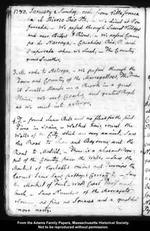
1780. JANUARY 2. SUNDAY.
Rode from Villa franca de el Bierzo Rio Pte [Puente]. We dined at Ponferrada. We passed through several Villages and over Bridges and Rivers. We passed Campo de Narraya, Cacabelos Rio P. [Puente] and Ponferrada where We dined. The Country grows smoother.
3. M.
Rode to Astorga. We passed through the Town and Country of the Marragattoes. The Town is small -- stands on a Brook in a great Plain. We met Coaches, and genteel People as We went into Astorga.
4. T.
Found clean Beds and no fleas for the first Time in Spain. Walked twice, round the Walls of the City, which are very ancient. Saw the Road to Leon and Bayonne, and the Road to Madrid. There is a pleasant Prospect of the Country, from the Walls. Saw the Market of Vegetables, onions and Turnips the largest I ever saw, Cabbages, Carrots &c. Saw the Market of Fuel -- Wood, Coal, Turf and brush. Saw Numbers of the Marragato Women, as fine as Squaws and a great deal more nasty.
Page 37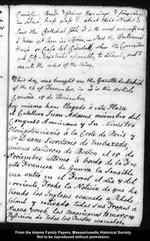
Crucifixes, Beads and Chains, Earrings and fingerrings in silver, brass, glass &c. about their Necks &c.
Saw the Cathedral Church, which is the most magnificent I have yet seen in Spain. Saw the Parliament House or Casa del Cieudad, where the Corregidor and City Magistrates assemble, to deliberate, and to execute the orders of the King.
This day, was brought me the Gazetta de Madrid of the 24 of December, in which is this Article
Coru a 15 de Diciembre.
Hoy mismo ban llegado esta Plaza el Caballero Juan Adams miembro del Congreso Americano y Su Ministro Plenipotenciario la Corte de Paris y Mr. Deane Secretario de Embaxada, quienes salieron de Boston el 15 de Noviembre ltimo bordo de la Fregata Francesa de Guerra la Sensible que entr en el Ferrol el dia 8 del corriente. Trahe la Noticia de que habiendo los Ingleses evacuado a Rhode Island y retirado todas sus Tropas Nueva Yorck, los Americanos tomaron Possesion de todos los Puestos evacuados.
Page 38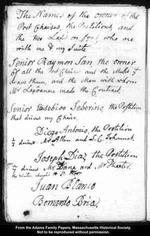
The Names of the Owner of the Post Chaises, the Postilions, and the two Lads on foot, who are with me and my Suite
Senior Raymon San, the Owner of all the Post Chaises and the Mules that draw them, and the Man with whom Mr. Lagoanere made the Contract.
Senior Eusebioo Seberino, the Postilion that drives my Chaise.
Diego Antonio, the Postilion that drives Mr. Allen and S. C. Johonnot.
Joseph Diaz, the Postillion that drives Mr. Dana and Mr. Thaxter. The Writer, educated at St. Iago.
Juan Blanco.
Bernardo Bria.
Page 39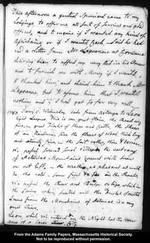
This Afternoon a genteel Spaniard came to my Lodgings, to offer me, all sorts of services and good offices, and to enquire if I wanted any kind of Assistance, or if I wanted Cash. -- Said he had received a Letter from Mr. Lagoanere at Corunna desiring him, to afford me every Aid in his Power and to furnish me with Money if I wanted. I thanked him, and desired him to thank Mr. Lagoanere, but to assure him that I wanted nothing, and that I had got so far very well.
1780. JANY. 5. WEDNESDAY.
Rode from Astorga to Leon, eight Leagues. This is one great Plain. The Road very fine. Great Flocks of Sheep and Cattle. The Sheep of an handsome size, the fleeces of Wool thick, long and extremely fine. The soil rather thin and barren. We passed several smal Villages. The vast rang of Asturias Mountains covered with Snow on our left. The Weather as pleasant as could be, tho cold -- some frost and Ice on the Roads. We passed the River and Bridge Orbigo, which in the Spring when swelled with Freshes of melted Snow from the Mountains of Asturias, is a very great River.
Leon, which We entered in the Night, has the Appearance of a large River City.
Page 40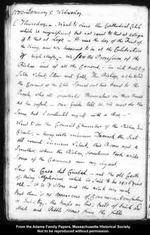
1780. January 5. Wednesday.
6 THURSDAY.
Went to view the Cathedral Church which is magnificent, but not equal to that at Astorga if to that at Lugo. It was the day of the Feast of the King, and We happened to be at the Celebration of high Mass. We saw the Procession, of the Bishop and of all the Canons, in rich Habits of Silk, Velvet, Silver and Gold. The Bishop, as he turned the Corners of the Church, spread out his Hand to the People, who all prostrated themselves on their Knees as he passed. Our Guide told Us, We must do the same, but I contented myself with a Bow.
Went to see the Council Chamber of the Bishop and Chapter -- hung with crimson Damask, the Seats all round crimson Velvet. This Room and a smaller, where the Bishop sometimes took aside some of the Cannons, were very elegant.
Saw the Casa del Ciudad, and the old Castle of King Alphonsus, which is said to be 1936 Years old. It is of Stone, and the Work very neat.
But there is no Appearance of Commerce, Manufactures or Industry. The Houses are low, built of brick and Mud and Pebble stones from the fields.
Page 41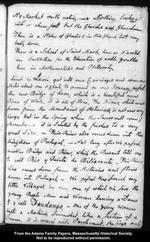
No Market worth notice. Nothing looks either rich or
chearfull but the Churches and Churchmen. There is a Statue of Charles 5 in this Church, but very badly done.
There is a School of Saint Mark here as it is called, an Institution for the Education of noble Youths here in Mathematicks and Philosophy.
Dined in Leon, got into our Carriages and upon our Mules about one O Clock, to proceed on our journey, passed the new Bridge of Leon, which is a beautiful new Piece of Work. It is all of Stone. The River, which comes down from the Mountains of Asturias, is not now very large, but in the Spring when the Snows melt upon the Mountains it is swelled by the freshes to a very great Size. This River also runs down into the Kingdom of Portugal. Not long after We passed another Bridge and River, which the Peasants told me to call Rio y Puente de Biliarente. This River also comes down from the Asturias and flows down into Portugal. We passed
thro several, very little Villages, in every one of which We saw the young People Men and Women dancing, a Dance that they call Fandango. One of the young Women beats a Machine, somewhat like a section of a Drum. It is covered with Parchment. She sings and
Page 42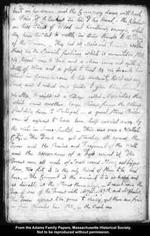
beats on her drum, and the Company dance, with Each a Pair of Clackers in his and her Hand. The Clackers are two Pieces of Wood, cut handsomely enough, which they have the Art to rattle in their Hands to the Time of the Drum. They had all, Males and Females, wooden shoes, in the Spanish fashion, which is mounted on stilts. We stopped once to look and a Man came out with a Bottle of Wine and a glass to treat Us. We drank his Wine in Complaisance to his Urbanity,
tho it was very Sour, and I ordered our Guide to give him somewhat.
We stop to night at a Village called Mansillas, thro which runs another large River from the Asturias, stretching down to Portugal. A great Stone Bridge over it, appears to have been half carried away by the Water in some freshet. This was once a Walled City. The Tours are yet standing all round the Town and the Ruins and Fragments of the Wall and the Appearance of a Foss round it. The Towers were all made of small round Stones, not bigger than two fists, which is the only Kind of Stone to be had here. The Cement is the ancient, which is as hard and as durable as the Stones them selves. I went upon the Top of one of the Towers with Mr. D., Mr. A., and Mr. Charles. The Town appears to be gone to decay, yet there are four or five Churches here still. The People are [sentence unfinished]
Inside Back Cover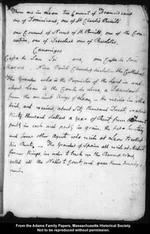
There are in Leon two Convents of Franciscans, one of Dominicans, one of St. Claudio Benito.
One Convent of Nuns of St. Benito, one of the Conception, one of Descalzas, one of Recoletas.
Canonigos.
Cassa de San Isi [Isidro] one, one Cassa de San Marcus. Nine Parish Churches, including the Cathedral.
The Grandee who is the Proprietor of the Land in and about Leon is the Comte de Luna, a Descendant from the ancient Kings of Leon. He resides in Madrid, and receives about sixty thousand Ducats, or about thirty thousand dollars a Year of Rent, from the Tenants, partly in cash and partly in Grain. He has a Secretary and some other Agents who reside at Leon to collect his Rents. The Grandees of Spain all reside at Madrid. Former Kings, in order to break up the Barons Wars, called all the Nobles to Court, and gave them Employments.
Back Cover












































